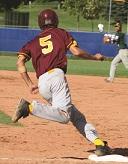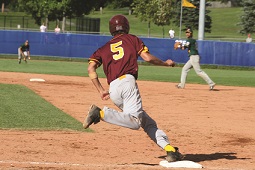

The key to economic success is to be great partner with the local communities in which you do business (or in which you are planning to do business) – that goes a long way to assuring your sports tournaments will be well received, strongly attended and ultimately profitable. Here are a few ways to assure a strong partnership with your host communities so that everyone wins from an economic impact standpoint, as well as from a community relations standpoint. While all of these ideas may not work for everyone, there should be enough take-aways to benefit your event, no matter what it is.
Start conversations early with host cities – and heed their advice
As you consider bringing an event to a town, be sure to talk to the DMO staff early in the planning process. These individuals are the experts on the cities that you are evaluating for tournaments. They know the community’s culture and rhythm, and they know it inside and out. The local CVB or sports commission staff probably can tell you right away the ideal times to host (and to avoid hosting) a tournament.
For example, every September, Grand Rapids hosts a free, 19-day international art event that attracts 400,000 people to the area. This is not a good month for a major sporting event to come to town, since our hotels are already bulging with visitors. However, because many Michiganders flock north in the summer to enjoy our lakes and beaches, hotels are not at capacity around the Fourth of July – a perfect time for a sports tournament that our hoteliers also greatly welcome.
As a result, USA Table Tennis has worked closely with us to fill this slot for the past three years for its US Open and has enjoyed a great experience, while our businesses enjoyed the economic impact at a time that otherwise would be slow. Consider the importance of open lines of communication for other event elements as well.
Remember that your host partner is going to be able to provide resources to help you in many other ways. For example, when it’s time to find volunteers, the local CVB or sports commission will be an important conduit for you. The same is true for media partners and for vendors relating to sports supplies, equipment and anything else needed. Just be sure to allow for plenty of lead time for optimum results.
Leverage community assets
Related to the first point, do your homework on a host city and what it offers in order to build out the strongest tournament possible. The sports commission and CVB staff have a full knowledge of what facilities are in their own backyard. Ask them about what events have been held there and what works well for each facility. Also, what do planners recommend for downtime activities for athletes of various age groups and interests once the games are done? Are there certain areas where shopping, dining and entertainment options are available? What fun things are there to make a visit unique?
In the case of Grand Rapids, we shared with USRowing that Grand Rapids is a microbrew mecca, and we created a craft beer garden as part of the USRowing Masters National Championships – something rowing participants from across the country enjoyed after competing as much as the spectators – and which benefited the local microbrew owners from a publicity and sales standpoint. Learn about the city’s best advantages and how can they be leveraged to generate a positive bottom line for the event. The bonus is that they will also make the event interesting and memorable for the athletes and spectators.
Also, keep abreast of a city’s assets even if you’ve been there before. Periodically check in with your CVB and sports commission contacts to find out what facilities are being built, expanded or renovated. Since sports tourism is such a rapidly expanding arena, many cities are constantly evolving and improving their facilities to attract more business.
New facilities especially provide an exciting tournament venue – and if you can get an early booking at a new facility, it adds an element of excitement and interest to your event and makes people want to register to play and attend – good for your tournament – and also stay in local hotels and eat in restaurants – good for the city.
In the case of West Michigan, we constructed a championship-level baseball/softball complex over the past few years since we saw a need in our sports venue inventory. The Art Van Sports Complex opened in August 2014, and we’ve already hosted four tournaments in 2014 and booked 23 of 27 playable weekends of 2015. Baseball/softball event planners who may have passed us over a few years ago are giving our region another look. It is always in the best interests of planners and rights holders to keep in touch with cities to find out what they have to offer – it really can change year to year.
Act like a local
Let’s face it – no one wants a big player that swoops into town with its own staff, quickly sets up shop for a tournament, takes most of the proceeds and then breezes out. If your commitment level to a community is only skin deep, you not only won’t be invited back for future years, but you will leave a negative impression that could spread to DMOs in other cities – and ultimately hurt your chances for future tournament bookings.
So while you’re not expected to actually become a local, remember that you’re an invited guest in another town – so do as the locals do. Work with the CVB to find community partners who will help support your event, from sporting clubs who can help spread the word, to service clubs who might provide volunteers (or consider a payment model that benefits service clubs and generates reliable volunteers). You might even give back to a local sporting club that assists you by donating funds or resources to their club.
In addition, consider this: while you probably have plenty of national suppliers on your roster for event-related merchandise such as clothing and trophies, consider buying local to keep the money in that community. Ordering 5,000 tee-shirts from a local vendor can have a significant financial impact for a small town – not to mention its ability to build good will for your organization and save your organization money in shipping fees. The CVB or sports commission can provide you with guidance regarding merchants they recommend and trust.
Book repeat business
We all know the sales adage that it’s cheaper to keep a current customer than it is to find a new one – it’s certainly the same with sporting events. And that holds true for both the local CVB and sports commission as much as the event planner. As you know, the first year of an event in a new community is often a learning year – establishing processes, meeting the personnel, learning the layout of a city and the proximity of venues and lodging, working with a Local Organizing Committee if needed, finding local partners, etc.
When you can bring back an event to the same city, the learning curve and subsequent planning work is minimized, which allows you to focus more on marketing the event to bring in crowds and revenue. And you’re more likely to generate increased numbers for an event that becomes a local favorite. As previously mentioned, Grand Rapids has hosted the USA Table Tennis-US Open for three years now, and the attendee figures have stayed strong as fans continue to tell friends and family about the excitement of the event.
As another administrative time saver, you might consider structuring your RFP process to include multiple tournament years in one bid application (the NCAA does a good job with this). CVBs and sports commissions all incur costs when submitting proposals – if you can include multiple host years in one bid application, it benefits all involved, and your CVBs will thank you.
Help promote your sport locally
While mainstream sports like basketball, baseball and volleyball need little introduction and crowd education when it comes to tournament promotion, CVBs may have a harder time promoting new and/or niche sporting tournaments in their communities – and this is where you can help. Develop a marketing plan to help promote the sport locally and attract spectators. That may involve arming communities with statistics about your sport and how it is growing, as well as demographics about the fan base (which can be very passionate). As always, advance notice is key to this effort.
If you’re bringing a tournament to a city that has never hosted that sport and where the sport isn’t a household name yet, work with the CVB or sports commission to plan a community event that is educational and fun in order to teach people about the sport. Maybe it’s a free clinic for kids or adults to try pickleball – or a media demonstration that also encourages them to cover the tournament. You can also promote your upcoming tournament at a multi-sport event in that same city earlier in the year.
If that last statement made you curious, consider this: there are 31 Summer State Games and 10 Winter State Games organizations throughout the country, and those games are constantly adding new sports to accommodate trends. In Michigan alone, we have added pickleball, fat bike, wakeboard and CrossFit among other sports in the last couple of years and will continue adding more based on emerging sports. Promoting your future tournament to the athletes in that multi-game event might encourage them to return to the city and compete in your tournament – and to bring their friends and family with them when they come.
And finally, consider ways to amp up an event’s appeal from a spectator standpoint. Maybe you hire a few elite athletes to play in the tournament to help draw a crowd – or you get a celebrity who plays your sport to help spread the word. For example, our sports commission learned that comedian/actor Judah Friedlander (who was in town for a large comedy festival) was also a USA Table Tennis-rated player, and we created a media-access-only table tennis match between him and a USA Table Tennis Hall-of-Famer to drum up awareness of the USA Table Tennis-US Open. There are all kinds of ways to expand the image of your event; all you need to do is work with the local hosting organization to come up with the ideas.
Youth and amateur sports tourism certainly is an economic boon for the U.S. economy – and there are ways to leverage each tournament to drive the most economic impact for all parties involved. It starts with being a great partner to your host cities. Maximize chances of financial success for both you and the local community by establishing open lines of communication, leveraging community assets, becoming part of the community, booking repeat business and helping promote your sport. Everyone wins that way.

